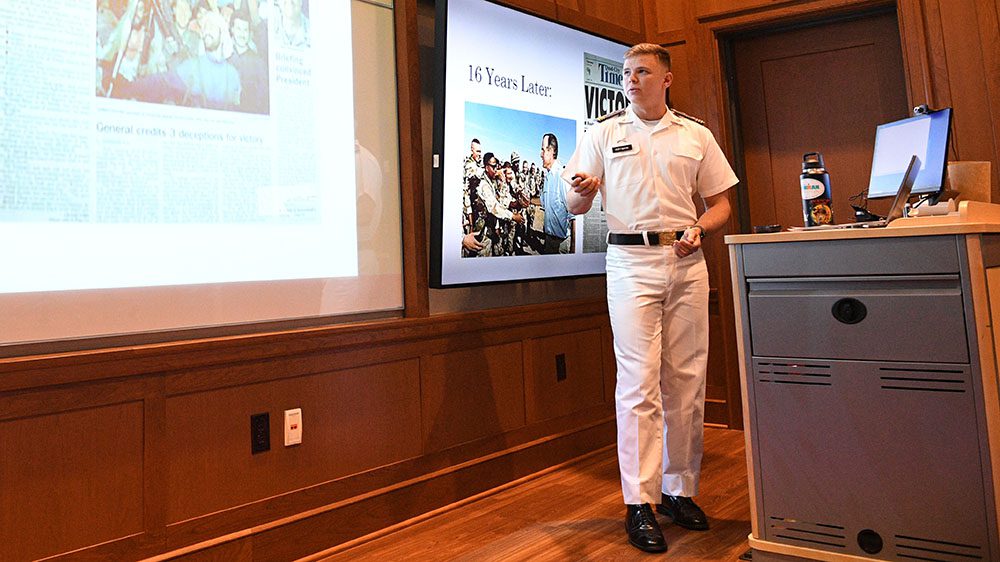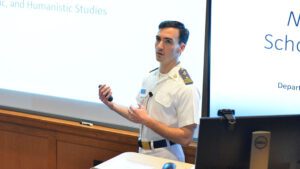Honors Week Held at VMI

Cadet Michael M. Hoffmann ’22, a double major in history and international studies, presents his thesis, “Kicking the Army’s Vietnam Syndrome: The Cultural Renaissance of the Post-Vietnam Army.”—VMI Photo by Kelly Nye.

Cadet Michael M. Hoffmann ’22, a double major in history and international studies, presents his thesis, “Kicking the Army’s Vietnam Syndrome: The Cultural Renaissance of the Post-Vietnam Army.”—VMI Photo by Kelly Nye.
Honors Week, an annual event since 2003, showcases cadet research and scholarship across all disciplines. During the event, held March 21-31, 34 cadets presented their research to the wider VMI community, and many cadets were inducted into academic honor societies.
Cadet Michael M. Hoffmann ’22, a double major in history and international studies and commander of the 1st Battalion, defended his thesis in his presentation titled, “Kicking the Army’s Vietnam Syndrome: The Cultural Renaissance of the Post-Vietnam Army.”
In his presentation, Hoffmann reported that after the Vietnam War, the Army suffered from malaise, disillusionment, drug use, and terrible morale. Yet just 16 years later, in 1991, there was a decisive military victory in Iraq.
The extreme and significant change, Hoffmann argued, was due to the new culture in the Army, brought on by organizational honesty and leadership with new insight. He describes culture as the linchpin, a vital component that holds all other aspects of the Army together.
Hoffmann credits four conscientious commanders for the turnaround of the Army culture: Gen. William Westmoreland, who saw the importance of investing in people; Gen. John Cushman, who believed in teaching people how to think rather than what to think and believed in the strength of providing role models; Gen. Maxwell Thurman, who made organizational improvements and is credited with the slogan, “Be All You Can Be”; and Gen. Paul Gorman, who instituted the National Training Centers, which provide realistic and effective combat training exercises.
Cadet Rachael Dickenson ’22, who is double majoring in biology and civil engineering, said she chose to work with an ongoing soybean yield project because, “I believed it to be a balance of my two majors, with applications in biofuels and other engineering aspects.” She joked, “I was strongly discouraged from joining because of all the work involved.”
Her thesis titled, “Performance of Soybean Cultivars in Varying Rural Virginia Sites: Effect of Site Characteristics on Shoot Structure and Yield” examined the crop which provides food products such as tofu, edamame, soymilk, and soy sauce. It is also used as a high-protein animal feed. The oil from soybeans is used in margarine, cooking oil, and biofuel applications. It is a $168 million crop in the Commonwealth of Virginia alone.
The soybean project was originally started in 2017 by previous cadets in the biology department, under the guidance of Col. Anne Alerding, Ph.D. It involved planting nine different cultivars, which stands for “cultivated variety,” that is, different types within a species of plant, in two different sites within Virginia. Those sites are Orange, north of Charlottesville, which has a more clay-like soil, and Suffolk, which is closer to the coast and has a sandier soil. Once the plants were harvested, cadets removed the leaves, took photographs of them, dried the plants, and manually and painstakingly counted and weighed each seed.

Cadet Carson Knox ’22 discusses the relationship between writing and philosophy in his senior thesis presentation, “Nostromo and Schopenhauer’s Sublime.”—VMI Photo by Marianne Hause.
Dickenson joined the project already in progress. She began a new project phase involving computer science, statistical analysis, and image analysis. She wanted to use computer programming to speed up the process of assessing soybean yield and identifying the characteristics of the cultivars associated with an increased yield.
Dickenson concluded that soil was less important to the crop yield, which she confessed “was a bit of a surprise.” She discovered that the cultivar was more important. Dickenson’s work will be labor-saving for future studies predicting pod-to-plant ratio yield.
Cadet Carson Knox ’22 explored the relationship between writing and philosophy in his senior thesis presentation, “Nostromo and Schopenhauer’s Sublime.”
“Nostromo” is a novel written by Joseph Conrad, considered one of the greatest novelists to write in English. Knox said Conrad is one of his favorite authors, and he has enjoyed reading Conrad’s other books, such as “Heart of Darkness,” “Lord Jim,” and “The Secret Agent.”
“Nostromo” is one of Conrad’s lesser-known works, and Knox chose it specifically because little research has been done on the novel. Knox admitted that “Nostromo” is a hard book to get through and is not a lot of fun to read but worthy of study. Written in 1904, “Nostromo” is set in the imaginary South American country of Costaguana, which is threatened by a revolution. The main character, Nostromo, an honest Italian seaman, seeks to restore the country’s stolen silver treasure.
Knox looked at the German philosopher Arthur Schopenhauer’s influence on Conrad. According to Knox, Conrad was known to have read and was fond of Schopenhauer’s writings. Schopenhauer attributed suffering in life to what he called the “will,” which is striving, desire, urges, and attachment to everything that exists. His definition of the sublime is the ability to escape the “will,” bringing on a state of serenity and higher knowledge. An example of such an escape would be meditating on the vastness of the universe and acknowledging oneself to be nothing.
Knox concluded that Schopenhauer’s philosophy helps the reader understand Conrad and the motivation of the characters he created in “Nostromo.” The work is an ethical statement, which Knox believes is Conrad’s purpose in writing the book. The characters perform unselfish acts to benefit others and the common good.
Other 1st Class cadets who presented during Honors Week include Leon M. Thomas ’22, Logan M. Lamm ’22, Daniel T. Hamner ’22, Genevieve L. Petrassi ’22, Tanner P. Mallari ’22, Matthew W. Stann ’22, Jacob A. Luchansky ’22, Ethan J. Schlussel ’22, Emma L. Flora ’22, Rhett M. Rezendes ’22, Urie N. Conis ’22, Christopher M. Hulburt ’22, Andrew S. Broecker ’22, Jonathan T. Tobin ’22, Kyle W. Tidwell ’22, Christopher H. Soo ’22, Robert T.C. Hoeft ’22, James D. Foster ’22, Thaddeus Z. Wegrzyn ’22, Loic R. Bignan ’22, Joseph L. Malazo ’22, Bridget A. Hughes ’22, Drew P. Melusen ’22, Noah E. Kirk ’22, Alexander S. DiPrampero ’22, Grayson H. Hurst ’22, Ana L. Lawrence ’22, Jackson D. Mercer ’22, Luke S. Nicksic ’22, Caleb J. Ogle ’22, and Alexander N. Rice ’22.